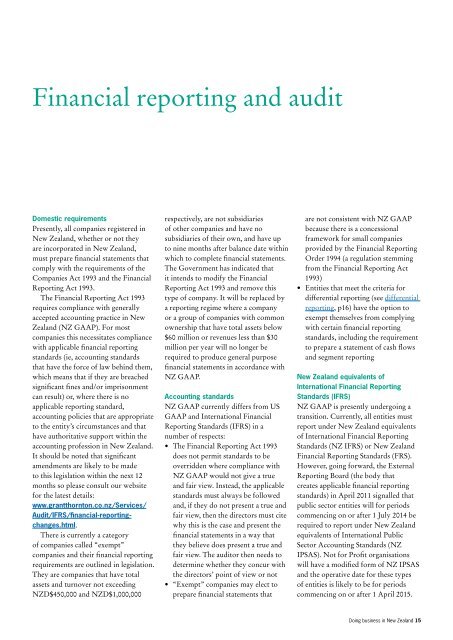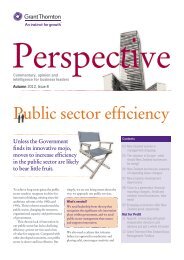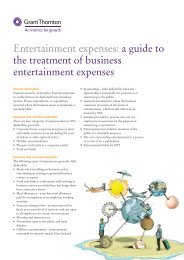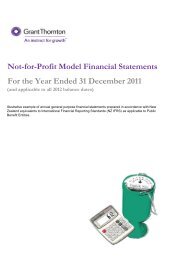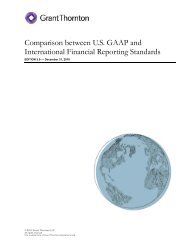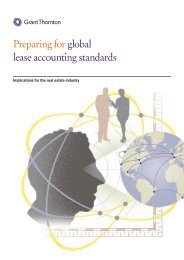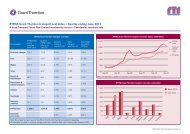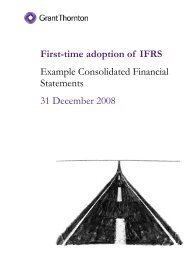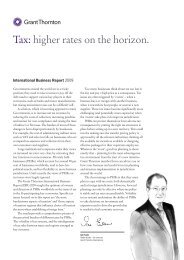Doing business in New Zealand - Grant Thornton
Doing business in New Zealand - Grant Thornton
Doing business in New Zealand - Grant Thornton
Create successful ePaper yourself
Turn your PDF publications into a flip-book with our unique Google optimized e-Paper software.
F<strong>in</strong>ancial report<strong>in</strong>g and audit<br />
Domestic requirements<br />
Presently, all companies registered <strong>in</strong><br />
<strong>New</strong> <strong>Zealand</strong>, whether or not they<br />
are <strong>in</strong>corporated <strong>in</strong> <strong>New</strong> <strong>Zealand</strong>,<br />
must prepare f<strong>in</strong>ancial statements that<br />
comply with the requirements of the<br />
Companies Act 1993 and the F<strong>in</strong>ancial<br />
Report<strong>in</strong>g Act 1993.<br />
The F<strong>in</strong>ancial Report<strong>in</strong>g Act 1993<br />
requires compliance with generally<br />
accepted account<strong>in</strong>g practice <strong>in</strong> <strong>New</strong><br />
<strong>Zealand</strong> (NZ GAAP). For most<br />
companies this necessitates compliance<br />
with applicable f<strong>in</strong>ancial report<strong>in</strong>g<br />
standards (ie, account<strong>in</strong>g standards<br />
that have the force of law beh<strong>in</strong>d them,<br />
which means that if they are breached<br />
significant f<strong>in</strong>es and/or imprisonment<br />
can result) or, where there is no<br />
applicable report<strong>in</strong>g standard,<br />
account<strong>in</strong>g policies that are appropriate<br />
to the entity’s circumstances and that<br />
have authoritative support with<strong>in</strong> the<br />
account<strong>in</strong>g profession <strong>in</strong> <strong>New</strong> <strong>Zealand</strong>.<br />
It should be noted that significant<br />
amendments are likely to be made<br />
to this legislation with<strong>in</strong> the next 12<br />
months so please consult our website<br />
for the latest details:<br />
www.grantthornton.co.nz/Services/<br />
Audit/IFRS/f<strong>in</strong>ancial-report<strong>in</strong>gchanges.html.<br />
There is currently a category<br />
of companies called “exempt”<br />
companies and their f<strong>in</strong>ancial report<strong>in</strong>g<br />
requirements are outl<strong>in</strong>ed <strong>in</strong> legislation.<br />
They are companies that have total<br />
assets and turnover not exceed<strong>in</strong>g<br />
NZD$450,000 and NZD$1,000,000<br />
respectively, are not subsidiaries<br />
of other companies and have no<br />
subsidiaries of their own, and have up<br />
to n<strong>in</strong>e months after balance date with<strong>in</strong><br />
which to complete f<strong>in</strong>ancial statements.<br />
The Government has <strong>in</strong>dicated that<br />
it <strong>in</strong>tends to modify the F<strong>in</strong>ancial<br />
Report<strong>in</strong>g Act 1993 and remove this<br />
type of company. It will be replaced by<br />
a report<strong>in</strong>g regime where a company<br />
or a group of companies with common<br />
ownership that have total assets below<br />
$60 million or revenues less than $30<br />
million per year will no longer be<br />
required to produce general purpose<br />
f<strong>in</strong>ancial statements <strong>in</strong> accordance with<br />
NZ GAAP.<br />
Account<strong>in</strong>g standards<br />
NZ GAAP currently differs from US<br />
GAAP and International F<strong>in</strong>ancial<br />
Report<strong>in</strong>g Standards (IFRS) <strong>in</strong> a<br />
number of respects:<br />
• The F<strong>in</strong>ancial Report<strong>in</strong>g Act 1993<br />
does not permit standards to be<br />
overridden where compliance with<br />
NZ GAAP would not give a true<br />
and fair view. Instead, the applicable<br />
standards must always be followed<br />
and, if they do not present a true and<br />
fair view, then the directors must cite<br />
why this is the case and present the<br />
f<strong>in</strong>ancial statements <strong>in</strong> a way that<br />
they believe does present a true and<br />
fair view. The auditor then needs to<br />
determ<strong>in</strong>e whether they concur with<br />
the directors’ po<strong>in</strong>t of view or not<br />
• “Exempt” companies may elect to<br />
prepare f<strong>in</strong>ancial statements that<br />
are not consistent with NZ GAAP<br />
because there is a concessional<br />
framework for small companies<br />
provided by the F<strong>in</strong>ancial Report<strong>in</strong>g<br />
Order 1994 (a regulation stemm<strong>in</strong>g<br />
from the F<strong>in</strong>ancial Report<strong>in</strong>g Act<br />
1993)<br />
• Entities that meet the criteria for<br />
differential report<strong>in</strong>g (see differential<br />
report<strong>in</strong>g, p16) have the option to<br />
exempt themselves from comply<strong>in</strong>g<br />
with certa<strong>in</strong> f<strong>in</strong>ancial report<strong>in</strong>g<br />
standards, <strong>in</strong>clud<strong>in</strong>g the requirement<br />
to prepare a statement of cash flows<br />
and segment report<strong>in</strong>g<br />
<strong>New</strong> <strong>Zealand</strong> equivalents of<br />
International F<strong>in</strong>ancial Report<strong>in</strong>g<br />
Standards (IFRS)<br />
NZ GAAP is presently undergo<strong>in</strong>g a<br />
transition. Currently, all entities must<br />
report under <strong>New</strong> <strong>Zealand</strong> equivalents<br />
of International F<strong>in</strong>ancial Report<strong>in</strong>g<br />
Standards (NZ IFRS) or <strong>New</strong> <strong>Zealand</strong><br />
F<strong>in</strong>ancial Report<strong>in</strong>g Standards (FRS).<br />
However, go<strong>in</strong>g forward, the External<br />
Report<strong>in</strong>g Board (the body that<br />
creates applicable f<strong>in</strong>ancial report<strong>in</strong>g<br />
standards) <strong>in</strong> April 2011 signalled that<br />
public sector entities will for periods<br />
commenc<strong>in</strong>g on or after 1 July 2014 be<br />
required to report under <strong>New</strong> <strong>Zealand</strong><br />
equivalents of International Public<br />
Sector Account<strong>in</strong>g Standards (NZ<br />
IPSAS). Not for Profit organisations<br />
will have a modified form of NZ IPSAS<br />
and the operative date for these types<br />
of entities is likely to be for periods<br />
commenc<strong>in</strong>g on or after 1 April 2015.<br />
<strong>Do<strong>in</strong>g</strong> <strong>bus<strong>in</strong>ess</strong> <strong>in</strong> <strong>New</strong> <strong>Zealand</strong> 15


